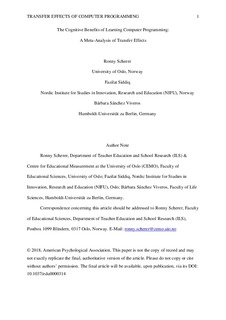| dc.description.abstract | Does computer programming teach students how to think? Learning to program computers has gained considerable popularity, and educational systems around the world are encouraging students in schools and even children in kindergartens to engage in programming activities. This popularity is based on the claim that learning computer programming improves cognitive skills, including creativity, reasoning, and mathematical skills. In this meta-analysis, we tested this claim performing a 3-level, random-effects meta-analysis on a sample of 105 studies and 539 effect sizes. We found evidence for a moderate, overall transfer effect (g = 0.49, 95% CI [0.37, 0.61]) and identified a strong effect for near transfer (g = 0.75, 95% CI [0.39, 1.11]) and a moderate effect for far transfer (g = 0.47, 95% CI [0.35, 0.59]). Positive transfer to situations that required creative thinking, mathematical skills, and metacognition, followed by spatial skills and reasoning existed. School achievement and literacy, however, benefited the least from learning to program. Moderator analyses revealed significantly larger transfer effects for studies with untreated control groups than those with treated (active) control groups. Moreover, published studies exhibited larger effects than gray literature. These findings shed light on the cognitive benefits associated with learning computer programming and contribute to the current debate surrounding the conceptualization of computer programming as a form of problem solving. | nb_NO |
